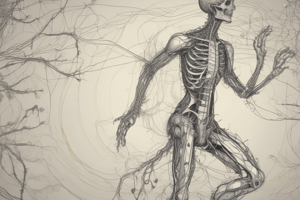Podcast
Questions and Answers
What is the region between the neck and the abdomen called?
What is the region between the neck and the abdomen called?
thorax
What are the compartments of the thoracic cavity?
What are the compartments of the thoracic cavity?
- Left and right lungs, heart
- Left and right pleural cavity, mediastinum (correct)
- Mediastinum, diaphragm
- Abdomen, pelvis
The mediastinum can be entered surgically without opening the pleural cavities.
The mediastinum can be entered surgically without opening the pleural cavities.
True (A)
What separates the thorax from the abdomen?
What separates the thorax from the abdomen?
At which vertebral level does the inferior vena cava pierce the diaphragm?
At which vertebral level does the inferior vena cava pierce the diaphragm?
What is the upper boundary of the thoracic cavity called?
What is the upper boundary of the thoracic cavity called?
Which structure passes through the superior thoracic aperture?
Which structure passes through the superior thoracic aperture?
The adult superior thoracic aperture measures approximately 6.5 cm anteroposteriorly.
The adult superior thoracic aperture measures approximately 6.5 cm anteroposteriorly.
The ______ provides the ring-like origin of the diaphragm.
The ______ provides the ring-like origin of the diaphragm.
What is the clinical significance of the sternal angle?
What is the clinical significance of the sternal angle?
Flashcards are hidden until you start studying
Study Notes
Thoracic Introduction
- The thorax is the area between the neck and abdomen, shaped like a truncated cone.
- It is narrow superiorly and widens inferiorly, flattened front to back but rounded at the sides.
- It is enclosed by the thoracic wall and diaphragm.
- The diaphragm separates the thorax from the abdomen.
Thoracic Cavity
- The thoracic cavity is further divided into the left and right pleural cavities and the mediastinum.
- The mediastinum is a thick, flexible partition in the middle, separating the pleural cavities.
Relationships with other body regions
- The thorax connects to the neck through the superior thoracic aperture.
- The upper limb is connected through the axillary inlet on each side of the aperture.
- Structures pass between the abdomen and thorax by either penetrating the diaphragm or passing behind it.
Thoracic Wall Boundaries
- The thoracic wall is made up of the skeletal elements (thoracic cage), skin, and subcutaneous tissue.
- The skeletal framework includes ribs, costal cartilages, and intercostal spaces.
- The mammary glands are embedded in the subcutaneous tissue of the anterior thoracic wall.
Clinical Significance: Sternal Angle
- It is used to identify the location of rib II and used as a reference point for counting ribs.
- It marks the boundary between the superior and inferior mediastinum and the superior limit of the pericardium.
- It marks the beginning and end of the aortic arch and where the superior vena cava enters the pericardium.
- It is also the location where the trachea divides into the right and left bronchi and the superior limit of the pulmonary trunk.
Thoracic Apertures
- There are two openings to the thoracic cavity: the superior and inferior thoracic apertures.
- The smaller superior aperture connects to the neck and upper limb.
- The larger inferior aperture is partially closed by the diaphragm.
Superior Thoracic Aperture
- It is bordered by the body of vertebra T1 posteriorly, the first pair of ribs laterally, and the superior border of the manubrium anteriorly.
- It is also called the thoracic inlet because air and food enter the thorax through this opening.
- Structures that pass through include the trachea, esophagus, nerves, and blood vessels.
Inferior Thoracic Aperture
- It is bounded by the body of vertebra T12 posteriorly, the 11th and 12th ribs posterolaterally, and the costal cartilages of the 7th to 10th ribs anterolaterally.
- The diaphragm originates from this opening and completely closes it.
Studying That Suits You
Use AI to generate personalized quizzes and flashcards to suit your learning preferences.



